Varieties of Alcohol Distillers for home distillation
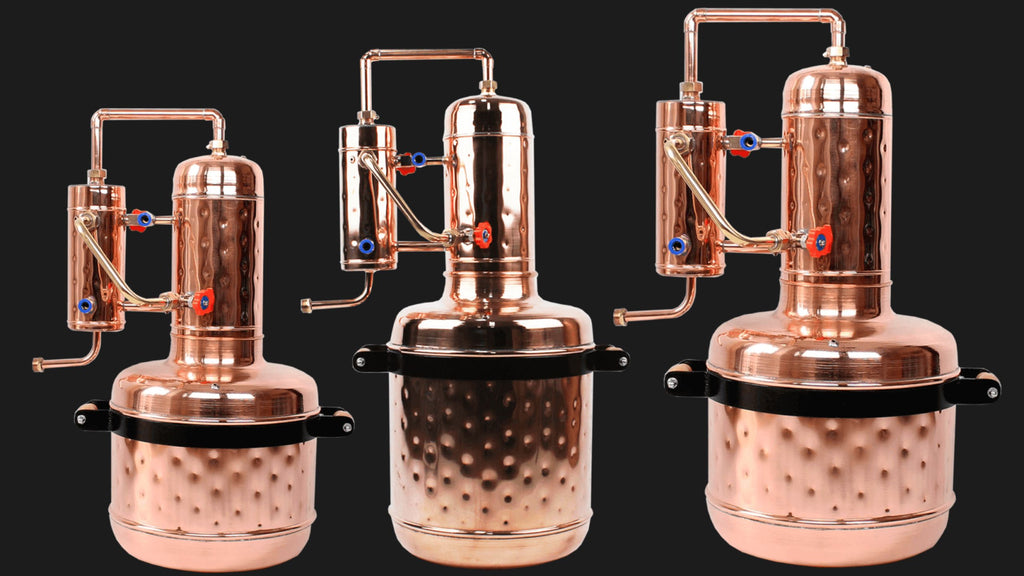
Copper stills for making alcohol are reasonably practical devices familiar to humanity for centuries. In addition to visual aesthetics, the copper moonshine still guarantees high alcohol purification. As a result, homemade moonshine, whiskey, and cognac will be rich in taste. World distilleries also choose copper devices for their capacities because the products obtained in this way are of the highest quality.
- Distillation is a blend of art and science where fermented liquid undergoes heating, vaporization, and cooling to create spirits. There are several types of distillers used, such as pot, column, hybrid, and reflux stills.
- Copper moonshine stills are revered for their ability to improve the taste of spirits, ensure even heat distribution, and offer benefits from traditional methods with modern technology; they can be custom-made to suit various distilling needs.
- Legal and safety considerations are paramount in home distilling. These include recognizing the need to comply with TTB regulations and maintaining vigilant safety practices, especially around heating sources.
Crafting Spirits with Copper Stills
Copper stills are a distiller's canvas, enabling the creation of a wide array of spirits. From whiskey and traditional rum to innovative spirits like fruit brandy and schnapps, these stills produce a diverse range of high-quality spirits. The secret lies in the material's ability to remove sulfur compounds, enhancing the flavor and aroma of the final spirit.
Beyond crafting traditional spirits, copper moonshine stills serve diverse functions, such as flavoring pre-made alcohol and conducting second distillation processes. They embody the love and labor that goes into crafting each spirit.
If you received moonshine without an expressive taste or aroma, you chose the wrong alcohol distiller. Thanks to our assortment and the help of consultants, you will select the right model and enjoy homemade drinks. The moonshine can be infused in oak barrels to make brandy or whiskey. If the drink is saturated with copper ions, it will be infused in a barrel for a long time, acquiring a unique smell, taste, and color.
Advantages of copper alcohol distiller
The classic version of copper pot stills is Alambic. When ordering a complete set of copper from us, you get distillation equipment with the following advantages:
- The ability to preserve the entire range of aromatic oils, which is especially important if you are preparing fruit or berry products;
- Exponential thermal conductivity, since the steam distiller heats up quickly and cools down rather slowly;
- Minimization of harmful components due to the shape of the copper pot stills since heavy suspensions of mash do not have time to rise to the top;
- Resistance to oxidation, so all components of the kit have a long service life;
The kits of different models are similar to each other, and in the assortment of our store, various modifications are available according to the following parameters:
- the volume of the pot;
- shape (cylindrical or round);
- column type: standard or reflux still for the highest quality products
- An electric, gas, or induction stove with a converter disk for nonferrous metals can be used as a heating source.
The Features of our Copper moonshine still
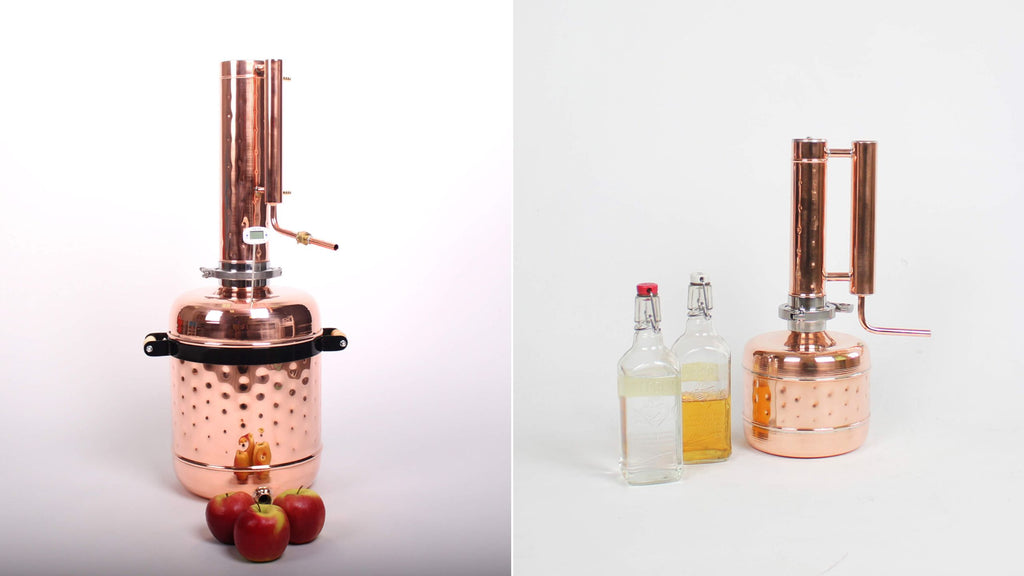
There can be a lot of debate among distillers over which type of alcohol distiller is the best. We want to make it clear.
Unique Design: The model—"flavor still"—differs from analogs on the market. First, it's a small distiller, and you can use a home stove (gas or electronic).
Using a copper moonshine still, you can experiment with flavors and create exquisite scents. After all, making yourself is more valuable than buying mass-produced drinks. Every Gin bottle you produce is a masterpiece.
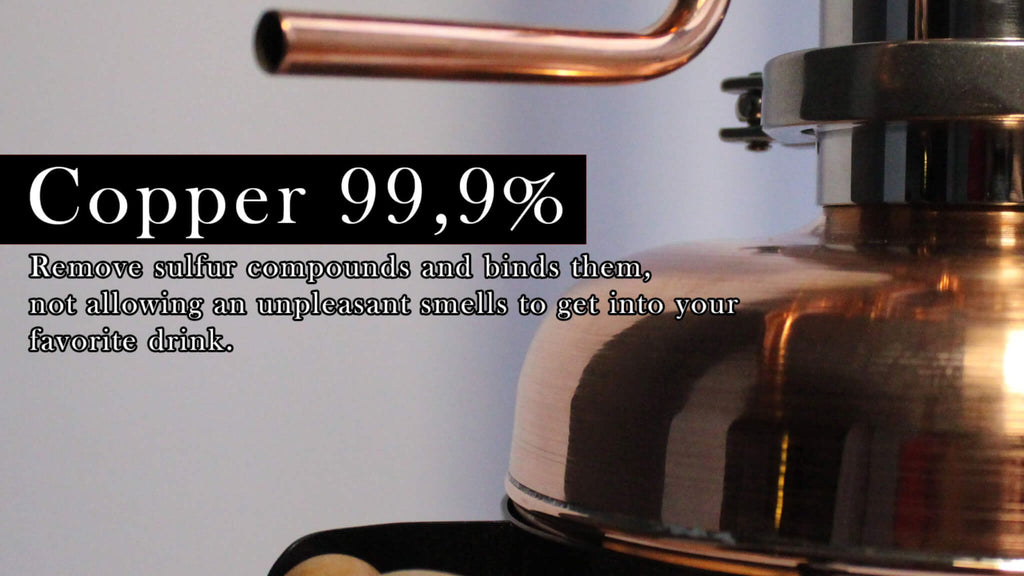
Natural copper: You might know copper has over four times the thermal conductivity of its closest rival, stainless steel. It also has a good reputation for removing toxins. Copper gives a fresh, brisk taste to all food and beverages. It has been reported to provide 30% to 50% better flavor than other cooking metals. The third feature, a gin basket (flavoring column & sieve), gives you more opportunities for experiments.
Varieties of copper moonshine stills
When it comes to distillers, there's an array of options, each with its unique benefits. Some popular types of distillers include:
- Pot stills are favored for creating spirits with robust, full-bodied profiles, thanks to a meticulous process of heating the fermented spirit. This copper distiller is suitable for flavoring alcohol that has already been prepared. You can fill the boiler with vodka or low-alcohol spirits from 12% ABV. Low cost and ease of operation make this a great starter still for those looking to get into distilling. At the same time, advanced moonshiners will find it practical to use the copper still for making a second distillation process. This gorgeous copper moonshine still produces high-quality spirits like whiskey, fruit brandy, schnapps, and grappa.
- Column stills: esteemed for efficient, large-scale production, thanks to their interconnected plate network
- Hybrid models: strike a balance between pot stills and column stills, offering durability and quality
- Reflux stills, especially popular among home distillers, excel at creating high-proof spirits like vodka with repeated distillations. This distiller has reflux (dephlegmator), which means that compared to pot stills, reflux stills are designed to create a higher proof with little to no flavor of alcohol. Reflux still is like a lot of pot stills assembled, which is why it can make multiple distillations in a single run. This is how vodka and rum are distilled and diluted to prove safe for human consumption. Reflux still is great for producing high-quality vodka, rum, grappa, tequila, and higher-proof whiskey.
Getting Started with Alcohol Home Distilling
Embarking on your home distilling journey can be an exciting endeavor. However, it requires a clear understanding of the process, the right equipment, and adherence to safety and legal guidelines.
Let's explore the essentials of home distilling, from the equipment you'll need to the safety precautions you must follow and the legal considerations you should be aware of.
Essential Equipment
Kickstarting your home distilling adventure requires some essential equipment. This includes:
- A heat source like a stove (electric or gas)
- A central water supply or pump for cooling
- Mash or prepare alcohol base
- Yeast for fermentation
- A hydrometer, a tool for measuring the alcohol content of spirits
You're one step closer to crafting your spirits with the right equipment.
Safety Precautions
When it comes to distilling, safety should always be your top priority. Here are some important safety tips to keep in mind:
- Monitor the distillation process closely and maintain ample ventilation to reduce the risk of fire and potential explosions, especially when using gas heating.
- Regularly inspect your distillation equipment for leaks to ensure safe operation.
- Never leave a still unattended during operation.
- Handle and safely dispose of the 'foreshots containing potentially harmful methanol.
By following these safety guidelines, you can ensure a safe and successful distillation process.
Frequently Asked Questions
What is the best thickness of copper for moonshine still?
For a durable moonshine still, 20 ounces of copper is the best thickness, especially if you expect rough handling or potential impact. It's thicker and feels more durable overall.
Is home distilling legal in Georgia?
Yes, owning a still in Georgia is legal as long as it's not used to distill spirits or make moonshine. It can be used for distilling water, essential oils, vinegar, and other products as long as it's not ethanol.
Is it legal to distill alcohol in Michigan?
Yes, it is legal to distill alcohol in Michigan, but you must obtain the necessary permits and licenses from the Alcohol and Tobacco Tax and Trade Bureau and check the regulations in your specific county.
What states is it legal to distill alcohol?
It is legal to distill alcohol for personal use in Alaska, Arizona, Maine, Massachusetts, Michigan, Missouri, Ohio, and Rhode Island. Additionally, Iowa has no specific laws against distilling homemade alcohol.
What do I need to start distilling?
To start distilling, you will need:
- Stove (electric or gas)
- Central water supply or pump for circulating water to the cooler. After receiving the distillate, you will need hydrometers to BV. We recommend buying in the nearest store or on our website.
- Mash \ Prepared alcohol (distilled), yeast


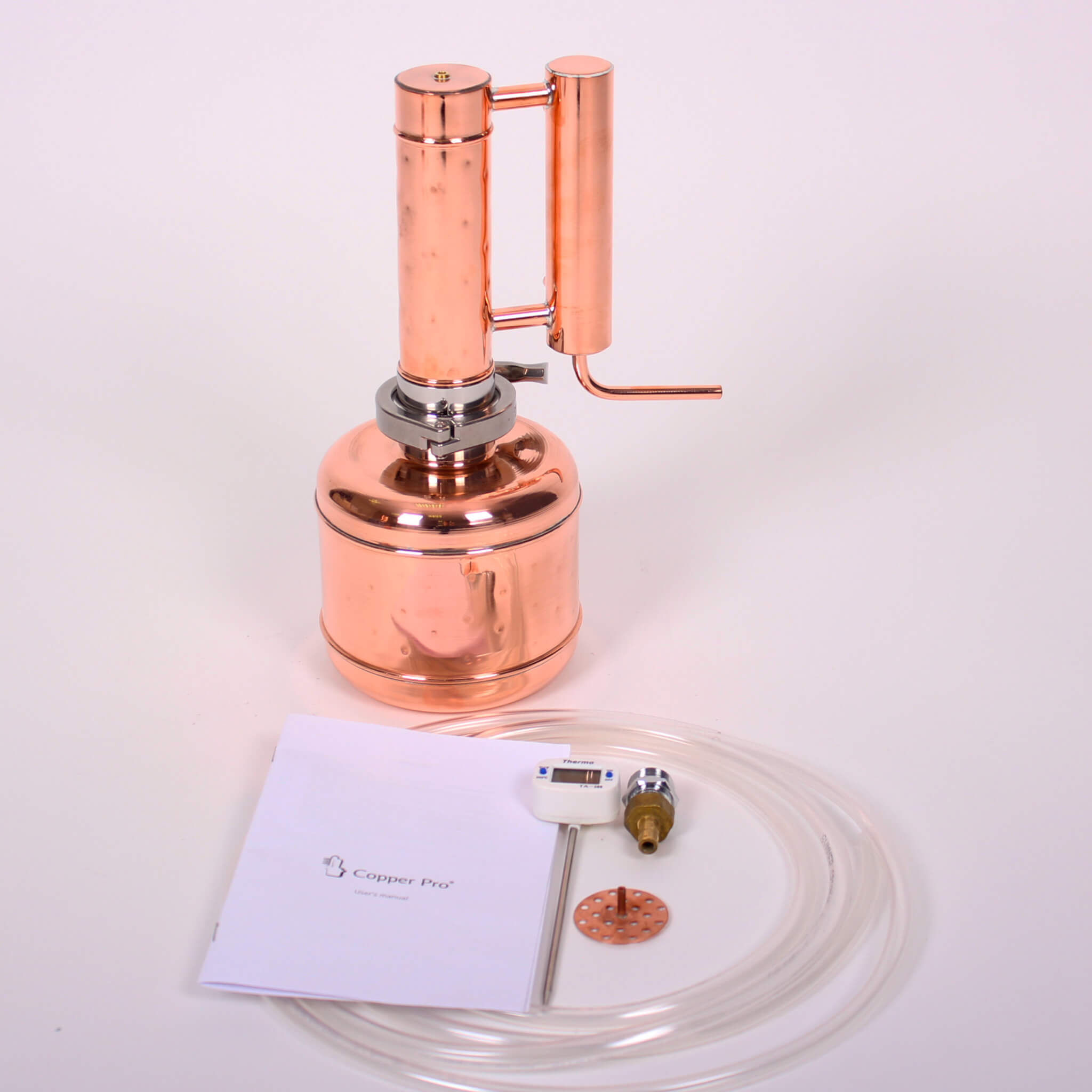
![Copper moonshine still 1.1G (4L) [ Pot still ] - Copper Pro](http://copper-pro.com/cdn/shop/files/copper-moonshine-still-11g-4l-pot-still-741681.jpg?crop=center&height=2048&v=1734980577&width=2048)
![Copper moonshine still 1.3G (5L) [ pot still ] - Copper Pro](http://copper-pro.com/cdn/shop/files/copper-moonshine-still-13g-5l-pot-still-675316.jpg?crop=center&height=1600&v=1734980580&width=1600)
![Copper distiller 2G (8L) [ pot still ] - Copper Pro](http://copper-pro.com/cdn/shop/files/copper-distiller-2g-8l-pot-still-171959.jpg?crop=center&height=1600&v=1734980581&width=1600)
![Copper moonshine still 3.3G (12L) | column 0.53G (2L) [ pot still ] - Copper Pro](http://copper-pro.com/cdn/shop/files/copper-moonshine-still-33g-12l-column-053g-2l-pot-still-932030.jpg?crop=center&height=1524&v=1734980582&width=1524)
![Copper moonshine still 4.8G (18L) | column 0.53G (2L) [ pot still ] - Copper Pro](http://copper-pro.com/cdn/shop/files/copper-moonshine-still-48g-18l-column-053g-2l-pot-still-629469.jpg?crop=center&height=1524&v=1734980583&width=1524)
![Copper moonshine still 6.3G (24L) [ pot still ] - Copper Pro](http://copper-pro.com/cdn/shop/files/copper-moonshine-still-63g-24l-pot-still-253228.jpg?crop=center&height=2048&v=1734980580&width=2048)
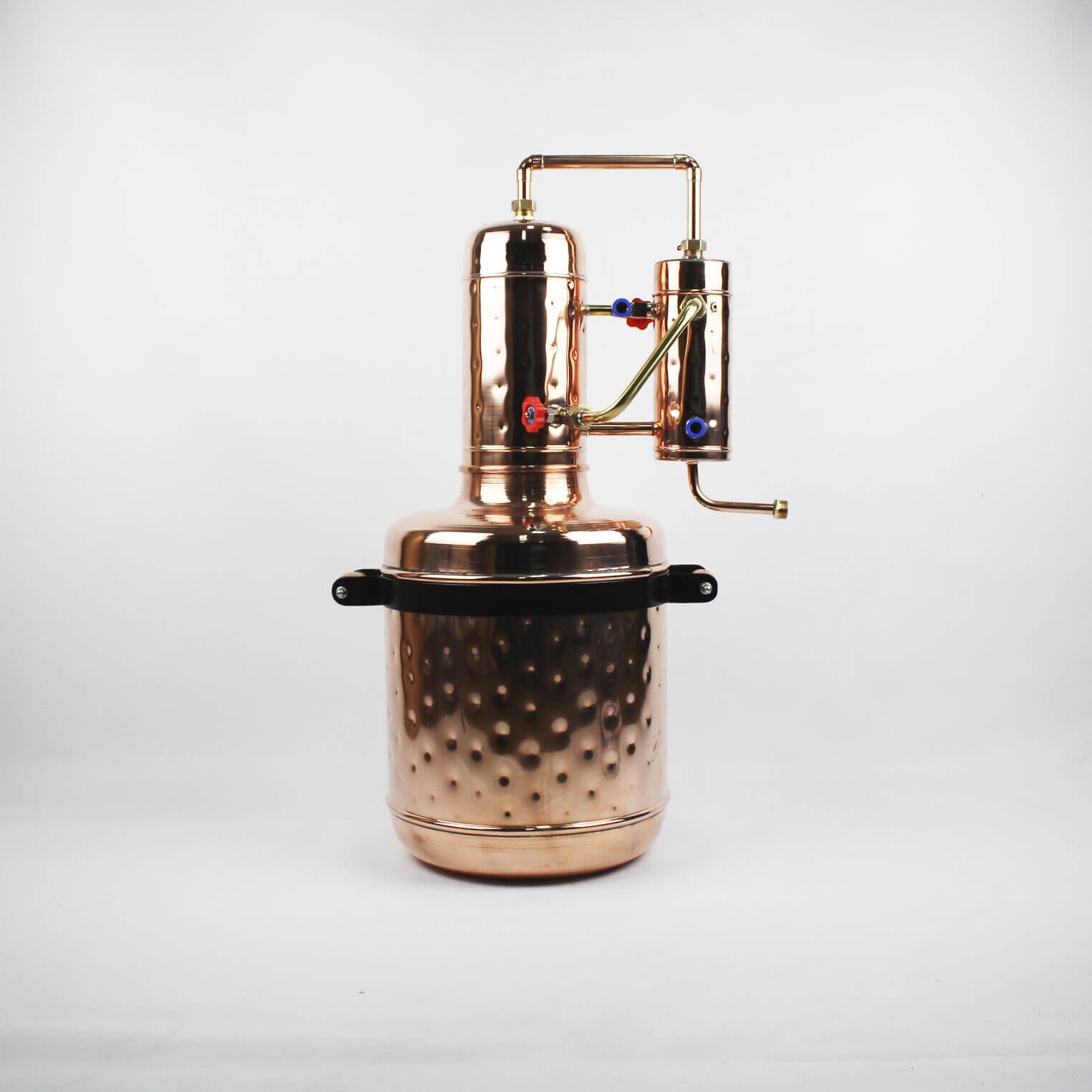
![Copper moonshine still - 11G (42L) [ Reflux still ] - Copper Pro](http://copper-pro.com/cdn/shop/files/copper-moonshine-still-11g-42l-reflux-still-490912.jpg?crop=center&height=2048&v=1734980586&width=2048)
![Electric moonshine still - 11G (42L) [ Reflux still ] - Copper Pro](http://copper-pro.com/cdn/shop/files/electric-moonshine-still-11g-42l-reflux-still-103311.jpg?crop=center&height=2048&v=1734980602&width=2048)